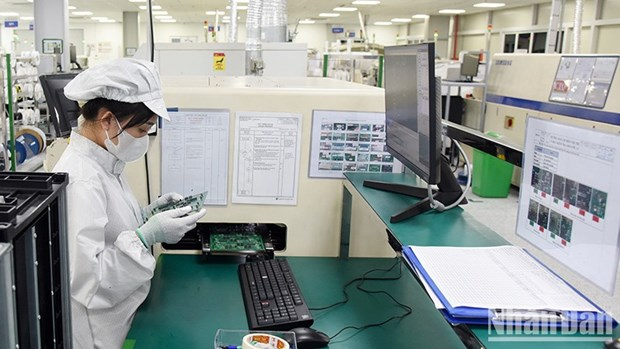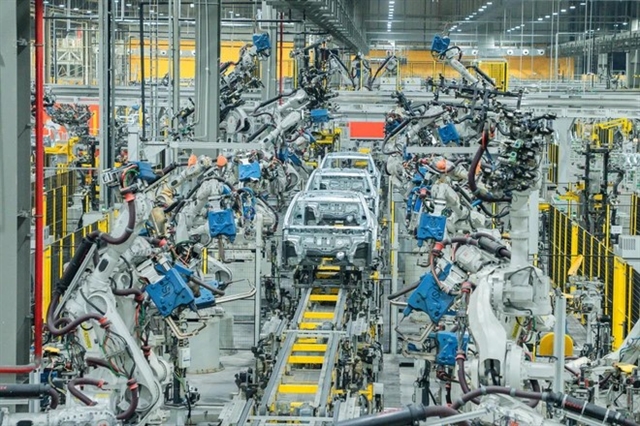 Economy
Economy

 |
| A production line of the VinFast car factory in Hải Phòng. Localisation rate of Vietnamese auto makers is low. Photo courtesy of Vietnam+ |
Local experts and economists have highlighted the urgent need for strategies to boost the localisation rate in the Vietnamese car industry.
Currently, the production value of the supporting industry for automobiles represents only 2.7 per cent of the overall industry value, which is alarmingly low compared to regional standards.
The local car industry still faces significant challenges related to competitiveness and localisation. Despite having 377 automobile enterprises, with nearly half being foreign direct investment (FDI) firms, the country relies heavily on imports, sourcing about 80 per cent of car components, according to the experts.
The number of local suppliers remains limited, with fewer than 100 tier 1 suppliers and around 150 tier 2 and 3 suppliers. This lack of a robust local supply chain hinders the industry's ability to increase its competitiveness in both domestic and international markets.
To address these problems, stakeholders are looking for solutions to foster local production and reduce dependency on imports, ultimately aiming to enhance the overall development of Việt Nam's automobile industry.
Director Lê Ngọc Anh of VinFast highlighted the critical need for collaboration and integration to overcome these barriers. The focus on long-term strategies to foster a stronger local supply chain will be crucial for Việt Nam to position itself as a competitive player in the global automotive market.
Investments in technology, favourable policies and industry-wide cooperation could significantly boost localisation, paving the way for sustainable growth in Việt Nam's auto industry.
Phạm Chi Lan, former vice president of the Vietnam Chamber of Commerce and Industry (VCCI), has highlighted significant challenges in developing the country's supporting industries.
Việt Nam has since the 1990s welcomed 11 global automobile manufacturers, which were offered various incentives to generate local jobs and achieve a localisation rate of about 30 per cent within 10-15 years, along with technology transfer. However, many foreign investors tend to rely on their own supporting businesses from abroad, benefitting from the same incentives without promoting local industry growth.
 |
| WORKING ON AUTO: Employees at a Honda Vietnam car assembly factory in Vĩnh Phúc Province. VNA/VNS Photo Trần Việt |
This reliance hinders the development of Vietnamese supporting industries, especially given the disparity in corporate tax rates. Local enterprises face rates starting from 25 per cent (then reduced to 22 and 17 per cent), while foreign companies enjoy a lower rate of 10 per cent. This imbalance creates a challenging environment for local businesses.
VinFast director Anh addressed the challenges in Việt Nam's automobile manufacture by emphasising the company's commitment to producing cars while fostering the domestic supporting industry.
From the outset, VinFast has aimed to enhance localisation, thereby contributing to sustainable economic growth. The company has dedicated over 30 per cent of its production complex to supporting industrial zones, facilitating domestic enterprises' participation in the supply chain.
Currently, VinFast's localisation rate for electric vehicles exceeds 60 per cent, incorporating critical components like the body, engine, roof and shock absorbers. The company has successfully automated over 90 per cent of its production processes, ensuring quality and scalability that meet international standards.
VinFast's factory in Việt Nam features state-of-the-art workshops for stamping, welding, assembly and engine production, equipped with advanced technology from Germany, Austria and South Korea.
Anh highlighted VinFast's plans to increase the localisation rate to 84 per cent by 2026, focusing on producing components such as seats, wiring, lights, rims and brake-steering systems. Achieving domestic battery production would significantly increase the localisation rate, as batteries represent one of the highest value components in electric vehicles, he said.
Collaborative efforts
VinFast is actively pursuing its goals by collaborating with domestic enterprises experienced in manufacturing spare parts and components, as well as in logistics, assembly, and processing. The company is also partnering with FDI enterprises in the country to increase access to advanced technologies and modern management practices.
VinFast has established an integrated production ecosystem within its factory area, including a production support centre and a compatible supply chain. The company is committed to signing long-term contracts with qualified supporting enterprises, providing security for these businesses to invest and expand.
Trần Quốc Minh Đặng, general director of Y Chi Viet, underlined the significance of their collaboration with VinFast since 2020. They have supplied over 80 components and 60 plastic frames for VinFast vehicles, including the VF e34 and VF 9 models.
Y Chi Viet has provided highly precise plastic components, including those for Advanced Driver-Assistance Systems (ADAS), showcasing their technical capabilities and commitment to quality.
Dr Bùi Quang Tuấn, an economist, praised VinFast's achievements and expressed hope that the company would lead Việt Nam into a new era of innovation and high technology. He highlighted the importance of collaboration and rapid advancement in Việt Nam's economic model, focusing on science, technology, and sustainable development.
Experts agree that increasing the localisation rate is crucial not only for VinFast as a company, but also for the broader goal of enhancing the local supporting industry. VinFast's efforts contribute to building a robust ecosystem that supports sustainable economic growth in Việt Nam. VNS




